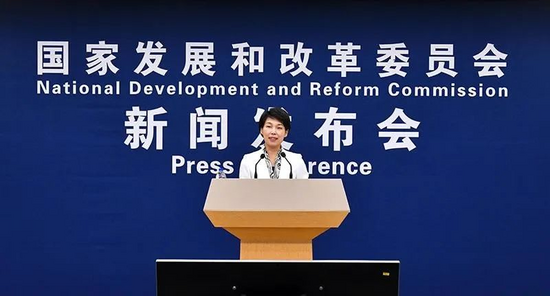On August 17, the National Development and Reform Commission held a regular press conference in August. Meng Wei, the spokesperson of the National Development and Reform Commission, answered reporters at the meeting on how to understand the need to correct the campaign-style "carbon reduction" and resolutely curb the blind development of the "two highs" projects. The phenomenon of gradual and orderly progress, first standing and then breaking the requirements, according to the requirements of the Politburo meeting of the Central Committee, coordinate and orderly do a good job of carbon peak and carbon neutrality. The National Development and Reform Commission is working with relevant departments to formulate and improve the carbon peak and carbon neutral "1+N" policy system, establish correct guidance, refine policy requirements, implement work, and increase supervision.

Meng Wei introduced that striving to achieve carbon peaks by 2030 and carbon neutrality by 2060 is a major strategic decision made by the Party Central Committee after careful consideration. Since the beginning of this year, all regions and departments have actively promoted carbon peaking and carbon neutralization and achieved certain results. However, in the work, some places, industries, and companies have “off-the-line” the focus of work, and the actions taken do not meet the requirements of seeking truth from facts, respecting the law, gradual and orderly progress, and breaking through first. This is mainly manifested in three aspects. :
One is that the goal is set too high and out of reality. Some localities, industries, and enterprises are eager to "grab the jackpot" and set goals beyond the development stage; some places implement "one size fits all" shutdown of high-energy-consuming projects; some financial institutions suddenly suspend loans to projects such as coal and electricity .
The second is to curb the weakness of the "two highs" actions. To curb the blind development of the "two highs" project is the top priority and top priority of the current carbon peak carbon neutralization work, but in some places the slogans are loud and the actions cannot keep up, and some places even launch the "two highs" project in violation of regulations. , The problem of building first without approval is more prominent.
The third is the weak foundation for energy conservation and emission reduction. Carbon neutrality is in the same line as energy conservation, emission reduction, and climate change. In some places, energy conservation and emission reduction work is not paid enough attention, and the implementation of "dual control" of energy consumption is not effective. Just now, the reduction in energy intensity in the first half of the year was reported. It is said that the situation is more severe; some industries have not done a good job in structural energy saving, technical energy saving, and management energy saving, but hope that certain technologies will solve the problem once and for all; Brands, carbon-neutral "hats" are flying all over the sky.
Meng Wei pointed out that these phenomena are contrary to the original intention and requirements of carbon peak carbon neutralization work and must be resolutely corrected. She stated that the Politburo meeting clearly requested that the carbon peaking and carbon neutralization work should be coordinated and orderly, and the carbon peaking action plan before 2030 should be issued as soon as possible. To break through immediately, we must also resolutely curb the blind development of the "two highs" project.
Meng Wei said that the National Development and Reform Commission is responsible for the office of the Leading Group for Carbon Peak Carbon Neutralization, and is working with relevant departments to formulate and improve the carbon peak carbon neutral "1+N" policy system. In the next step of the work, we will establish the correct orientation, refine the policy requirements, do a good job implementation, strengthen supervision, and promptly discover and correct related problems.
Meng Wei introduced that in order to curb the blind development of the "two highs" projects, the National Development and Reform Commission has recently carried out special inspections with relevant departments to urge local governments to reduce more than 350 "two highs" projects to be launched and reduce the demand for new energy consumption by 270 million. Tons of standard coal. In the next step, the National Development and Reform Commission will further improve and strengthen the energy consumption "dual control" system, formulate a three-year work plan, resolutely curb the blind development of the "two highs" projects, and resolutely take down the "two highs" projects that do not meet the requirements, and speed up Promote a comprehensive green transformation of economic and social development.
















 RCCN WeChat QrCode
RCCN WeChat QrCode Mobile WebSite
Mobile WebSite